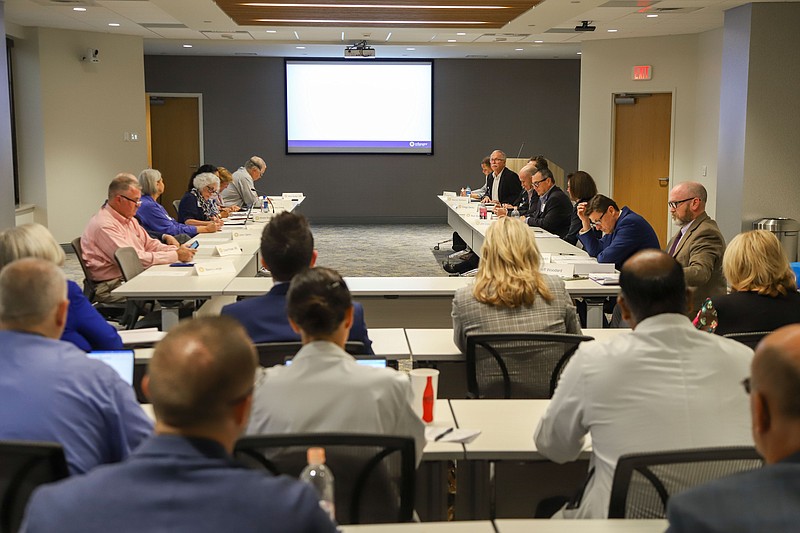In their last scheduled public meeting as a government entity, members of the Erlanger Health System board Thursday approved the new fiscal year budget as the trustees turned focus toward finalizing Erlanger's transition to an independent nonprofit.
After the meeting, board Chair Sheila Boyington said Erlanger leaders are still waiting for the Tennessee attorney general to sign off on the transition, the final step in a 16-monthlong process. Boyington said she doesn't foresee any issues obtaining that approval.
The new private entity — Erlanger Health — is set to launch July 1.
Erlanger Chief Financial Officer Lynn DeJaco commended her team for the many hours it worked putting next year's budget together while in the midst of the conversion, which includes reworking payer and vendor contracts and rolling financial data into the business software system for Erlanger Health.
"All of this is in the background in terms of making sure our employees don't feel any disruption," DeJaco said.
The Chattanooga-Hamilton County Hospital Authority, more commonly known as Erlanger Health System, is a government entity overseen by an 11-member board of trustees.
In February 2022, hospital and county leaders announced they planned to pursue transitioning Erlanger to a private, nonprofit model based on the idea that it would afford the safety net hospital a better chance to compete in the modern health care industry.
While much of the current board is set to roll over to the new private entity, the authority board will remain to oversee certain aspects of the old Erlanger as it "winds down."
Trustee Ken Conner, vice chair of the Erlanger board, will stay with the authority board. Duties of the authority board will include overseeing the pension plan, community health centers and the self-insurance trust, which covers liability of the authority. Erlanger's bonds will be jointly retained by the authority and Erlanger Health.
As current trustees move to the new board, Hamilton County Mayor Weston Wamp and the county's legislative delegation have tapped several new trustees to serve on the authority board.
Cory Gearrin, deputy mayor of Hamilton County and a former Major League Baseball player, has been appointed by Wamp. Gearrin served as a board member for the Major League Baseball Players Association's executive committee for six years and is also a candidate for a master's degree in business administration at the University of North Carolina at Chapel Hill, according to the latest Hamilton County Commission agenda.
Jeff Hollingsworth is another Wamp appointee. Hollingsworth recently retired after serving 16 years as a Circuit Court judge for Hamilton County, according to the commission agenda. Prior to becoming a judge, Hollingsworth was a partner in the Chattanooga law firm of Chambliss, Bahner and Stophel, where he led the litigation section.
The Hamilton County delegation has chosen Rebecca Hunter, who served as commissioner of the state Department of Human Resources for eight years under former Gov. Bill Haslam. Prior to that appointment, she spent six years as director of human resources for Hamilton County government and held management positions in government finance.
The delegation has one more slot to fill on the authority board, which is planned to consist of six members.
Erlanger Trustee Dr. Chris Poole, chief of the medical staff, will serve on both the authority board and the new board, Conner said.
The budget
Erlanger will close out its current fiscal year June 30 and then begin operating under the new budget approved by the board Thursday.
The fiscal year 2024 budget forecasts a net income of $12.5 million, a 2.1% operating margin and a capital budget expenditure of $28 million.
Inadequate bed capacity due to staffing shortages was Erlanger's biggest budget and finance challenge in the current fiscal year, according to the newly approved budget. Other challenges included cost of labor, cost of construction, supplies and lead times for equipment.
As a result, admissions and the amount of days patients spent in the hospital are on track to fall below budget for fiscal year 2023, though Erlanger is projecting to finish the year with $19.7 million in income and a 2.1% operating margin.
Erlanger "was able to manage costs and took action to stabilize pay for clinical personnel," the budget states. "Further, relationships developed with nursing schools in the region created a supply of students who gained clinical experience throughout our system of care and created a clinical staff that are committed to the mission of (Erlanger) for the upcoming year."
Erlanger is projecting 37,017 admissions in the new fiscal year, which is a 10.3% increase over the 33,564 projected for fiscal year 2023. The growth in admissions is an anticipated result of Erlanger adding more staff throughout the past year, allowing 61 previously unstaffed beds to reopen on the main campus.
Contact Elizabeth Fite at efite@timesfreepress.com or 423-757-6673.

